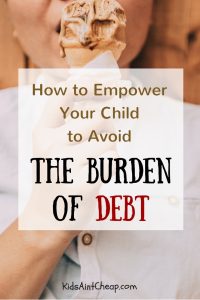 How many twentysomethings do you know starting their post-collegiate lives with six figures in student loan debt? How many times have you seen the burden of debt harm relationships, set back dreams, and perpetuate a lifestyle of “just getting by?”
How many twentysomethings do you know starting their post-collegiate lives with six figures in student loan debt? How many times have you seen the burden of debt harm relationships, set back dreams, and perpetuate a lifestyle of “just getting by?”
Has that ever described you?
I’ve experienced student loan debt, overspending my budget, racking up credit card debt, living paycheck to paycheck with no savings accounts, and fear about tomorrow because of debt.
Our culture isn’t so hot at teaching kids how dangerous debt can be, only how to accumulate it. I’m part of the blame because it was once my job to sell credit cards and car loans when I worked at a bank.
In 2012, my husband I paid off our last non-mortgage debt and couldn’t believe the freedom it afforded us. Having a taste for that made us decide to raise our children with that same debt-free mentality.
How to Empower Your Child to Avoid the Burden of Debt
Lead by example.
How did your parents handle money? If asked, could you list a few specific memories you have of their financial habits (good, bad, or ugly)?
If I had to guess, I’d say you remember quite a bit. Your kids will, too.
What you do with your finances, how you behave under stress, and how you treat others is all under frequent observation if you’re a parent.
It’s not all scary, though. If you choose to lean into this process, to do the best you can to lead a good example for your kids, the benefits are two-fold:
- Your financial habits will improve the more intentional you become. Your debt load will decrease and your future outlook with your family will look brighter.
- You will make a long-lasting impression on your kids of what healthy financial habits look like. As I stated early, they’re bound to remember a great deal of it.
Don’t put it off.
I once interviewed a father of seven who took the time each year to teach his kids about taxes. His reason?
I think one of the best things you can do for your children is to teach them about independence. Independent people earn a living and don’t come back to borrow money from mom and dad when they are in their thirties.
We try to prepare the children for the reality of adulthood by creating a culture that emulates the real world.
This father created jobs for each of the children to do around the house that would earn them a paycheck. He also implemented what he called the “Dad Tax.” Before each paycheck was distributed, he took out a 25% Dad Tax that went straight into the child’s savings account. Around tax time, he gave each child the option to have that money back as a “tax return” just like they would in the real world.
I didn’t know a thing about taxes until I was 20. How cool is it that this dad took on such a grown up topic and implemented it into his home while his children were young?
What’s the takeaway?
- Start the conversation. It’s never too early to talk to your children about debt and the huge impact it can have in their lives.
- Your kids are already watching. Be mindful of your actions and try your best to lead by example with your own day-to-day financial decisions.
Bonus Reading: “Money-Saving Tips for First-Year College Students”
What’s one lesson you’d like your children to learn that will help them avoid the burden of debt?
Image Credit: Xochi Romero (UnSplash)
